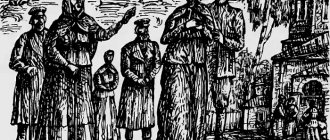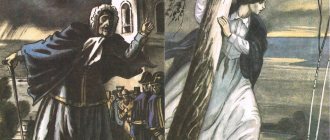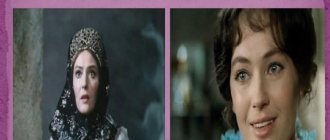Russian character of Katerina (“The Thunderstorm”)
Ostrovsky's drama "The Thunderstorm" stands out from the great variety of his plays precisely because of Katerina. In dramaturgy it is very rare to have a “living” positive hero. As a rule, the author has enough colors for negative characters, but the positive ones always come out primitive and sketchy. Perhaps because there is so little truly good in this world. Katerina, the main character of Ostrovsky’s drama, is the only thing good in that world, the “dark kingdom” of philistinism that surrounds her. The desire to fly is the main difference between Katerina and those people into whose trap she fell thanks to her marriage. But, unfortunately, there was only one way out of it.
From Katerina's words we learn about her childhood and adolescence. The girl did not receive a good education. She lived with her mother in the village. Childhood was joyful and cloudless. Her mother “doted on her” and did not force her to do housework. Katya lived freely: she got up early, washed herself with spring water, watered flowers, went to church with her mother, then sat down to do some work and listened to wanderers and praying mantises, of which there were many in their house. Katerina had magical dreams in which she flew under the clouds. And how strongly contrasted with such a quiet, happy life is the action of a six-year-old girl, when Katya, offended by something, ran away from home to the Volga in the evening, got into a boat and pushed off from the shore!..
We see that Katerina grew up as a happy, romantic, but limited girl. She was very devout and passionately loving. She loved everything and everyone around her: nature, the sun, the church, her home with wanderers, the beggars whom she helped. But the most important thing about Katya is that she lived in her dreams, apart from the rest of the world. From everything that existed, she chose only that which did not contradict her nature; the rest she did not want to notice and did not notice. That’s why the girl saw angels in the sky, and for her the church was a place where everything was light, where she could dream.
But if she encountered something on her way that contradicted her ideals, then she turned into a rebellious and stubborn nature and defended herself from that extraneous, stranger that boldly disturbed her soul. This was the case with the boat.
After marriage, Katya's life changed a lot. From a free, joyful, sublime world, in which she felt united with nature, the girl found herself in a life full of deception and cruelty. The point is not even that Katerina married Tikhon against her will: she didn’t love anyone at all and she didn’t care who she married. The fact is that the girl was robbed of her former life, which she created for herself. Katerina no longer feels such delight from visiting church; she cannot do her usual activities. Sad, anxious thoughts do not allow her to calmly admire nature. Katya can only endure as long as she can and dream, but she can no longer live with her thoughts, because cruel reality returns her to earth, to where there is humiliation and suffering.
Katerina is trying to find her happiness in her love for Tikhon: “I will love my husband. Silence, my darling, I won’t exchange you for anyone.” But sincere manifestations of this love are stopped by Kabanikha: “Why are you hanging around your neck, shameless woman? It’s not your lover you’re saying goodbye to.” Katerina has a strong sense of external humility and duty, which is why she forces herself to love her unloved husband. Tikhon himself, because of his mother’s tyranny, cannot truly love his wife, although he probably wants to. And when he, leaving for a while, leaves Katya to walk around to his heart's content, the woman becomes completely lonely.
Why did Katerina fall in love with Boris? After all, he did not demonstrate his masculine qualities, like Paratov in “Dowry”, and did not even talk to her. Probably the reason was that she lacked something pure in the stuffy atmosphere of Kabanikha’s house. And love for Boris was this pure, did not allow Katerina to completely wither away, somehow supported her. She went on a date with Boris because she felt like a person with pride and basic rights. It was a rebellion against submission to fate, against lawlessness. Katerina knew that she was committing a sin, but she also knew that it was still impossible to live any longer. She sacrificed the purity of her conscience for freedom.
In my opinion, when taking this step, Katya already felt the approaching end and probably thought: “It’s now or never.” She wanted to be satisfied with love, knowing that there would be no other opportunity. On the first date, Katerina told Boris: “You ruined me.” He is the reason for the disgrace of her soul, and for Katya this is tantamount to death. Sin hangs like a heavy stone on her heart. Katerina is terribly afraid of the approaching thunderstorm, considering it a punishment for what she did. Katerina has been scared of the elements ever since she started thinking about Boris. For her pure soul, even the thought of loving a stranger is a sin.
Katya cannot continue to live with her sin, and she considers repentance the only way to at least partially get rid of it. She confesses everything to her husband and Kabanikha. Such an act seems very strange and naive in our time. “I don’t know how to deceive; I can’t hide anything,” that’s Katerina. Tikhon forgave his wife, but did she forgive herself? Being very religious, Katya fears God, and her God lives in her, God is her conscience. The girl is tormented by two questions: how will she return home and look into the eyes of the husband she cheated on, and how will she live with a stain on her conscience. Katerina sees death as the only way out of this situation: “No, I don’t care whether I go home or go to the grave... It’s better in the grave... To live again? No, no, don’t... it’s not good..."
Haunted by her sin, Katerina leaves this life to save her soul. Dobrolyubov defined Katerina’s character as “decisive, integral, Russian.” Decisive, because she decided to take the last step, to die in order to save herself from shame and remorse. Whole, because in Katya’s character everything is harmonious, one, nothing contradicts each other, because Katya is one with nature, with God. Russian, because who, if not a Russian person, is capable of loving so much, capable of sacrificing so much, so seemingly obediently enduring all hardships, while remaining himself, free, not a slave.
Essay on the character of Katerina in the play Thunderstorm
Ostrovsky's drama "The Thunderstorm" stands out from the great variety of his plays precisely because of Katerina. In dramaturgy it is very rare to have a “living” positive hero. As a rule, the author has enough colors for negative characters, but the positive ones always come out primitive and sketchy. Perhaps because there is so little truly good in this world. Katerina, the main character of Ostrovsky’s drama, is the only thing good in that dark world, the “dark kingdom” of philistinism that surrounds her. The desire to fly is the main difference between Katerina and those people into whose trap she fell, thanks to her marriage. But, unfortunately, there was only one way out of the trap for her. From Katerina's words we learn about her childhood and adolescence; The girl did not receive a good education. She lived with her mother in the village. Katerina's childhood was joyful and cloudless. Her mother “doted on her” and did not force her to do housework. Katya lived freely: she got up early, washed herself with spring water, watered flowers, went to church with her mother, then sat down to do some work and listened to wanderers and praying mantises, of which there were many in their house. Katerina had magical dreams in which she flew under the clouds. And how strongly the action of a six-year-old girl contrasts with such a quiet, happy life, when Katya, offended by something, ran away from home on the Volga in the evening, got into a boat and pushed off from the shore!.. We see that Katerina grew up happy, romantic , but limited to a girl. She was very devout and passionately loving. She loved everything and everyone around her: nature, the sun, the church, her home with wanderers, the beggars whom she helped. But the most important thing about Katya is that she lived in her dreams, apart from the rest of the world. From everything that existed, she chose only that which did not contradict her nature; the rest she did not want to notice and did not notice. That’s why the girl saw angels in the sky, and for her the church was a place where everything was light, where she could dream. But if she encountered something on her way that contradicted her ideals, then a rebellious and stubborn nature manifested itself in her and she defended herself from that outsider, stranger, who dared to disturb her soul. This explains the incident with the boat. After marriage, Katya's life changed a lot. From a free, joyful, sublime world in which she felt united with nature, the girl found herself in a life full of deception, cruelty and doom. The point is not even that Katerina married Tikhon not of her own free will: she didn’t love anyone at all and she didn’t care who she married. The fact is that the girl was robbed of her former life, which she created for herself. Katerina no longer feels such delight from visiting church; she cannot do her usual activities. Sad, anxious thoughts do not allow her to calmly admire nature. Katya can only endure as long as she can and dream, but she can no longer live with her thoughts, because cruel reality returns her to earth, to where there is humiliation and suffering. Katerina is trying to find her happiness in her love for Tikhon: “I will love my husband. Ina is trying to find her happiness in her love for Tikhon: “I will love my husband. Silence, my darling, I won’t exchange you for anyone.” But sincere manifestations of this love are stopped by Kabanikha: “Why are you hanging around your neck, shameless woman? It’s not your lover you’re saying goodbye to.” Katerina has a strong sense of external humility and duty, which is why she forces herself to love her unloved husband. Tikhon himself, because of his mother’s tyranny, cannot truly love his wife, although he probably wants to. And when he, leaving for a while, leaves Katya to walk around to his heart's content, the woman becomes completely lonely. Why did Katerina fall in love with Boris? After all, he did not flaunt his masculine qualities, like Paratov, and did not even talk to her. Probably the reason was that she lacked something pure in the stuffy atmosphere of Kabanikha’s house. And love for Boris was this pure, did not allow Katerina to completely wither away, somehow supported her. She went on a date with Boris because she felt like a person with pride and basic rights. It was a rebellion against submission to fate, against lawlessness. Katerina knew that she was committing a sin, but she also knew that it was still impossible to live any longer. She sacrificed the purity of her conscience to freedom and Boris. In my opinion, when taking this step, Katya already felt the approaching end and probably thought: “It’s now or never.” She wanted to be satisfied with love, knowing that there would be no other opportunity. On the first date, Katerina told Boris: “You ruined me.” Boris is the reason for the disgrace of her soul, and for Katya this is tantamount to death. Sin hangs like a heavy stone on her heart/ Katerina is very afraid of the approaching thunderstorm, considering it a punishment for what she did. Katerina has been afraid of thunderstorms ever since she started thinking about Boris. For her pure soul, even the thought of loving a stranger is a sin. Katya cannot continue to live with her sin, and she considers repentance the only way to at least partially get rid of it. She confesses everything to her husband and Kabanikha. Such an act seems very strange and naive in our time. “I don’t know how to deceive; I can’t hide anything,” that’s Katerina. Tikhon forgave his wife, but did she forgive herself? Being very religious, Katya fears God, and her God lives in her, God is her conscience. A woman is tormented by two questions: how will she return home and look into the eyes of the husband she cheated on, and how will she live with a stain on her conscience. Katerina sees death as the only way out of this situation: “No, I don’t care whether I go home or go to the grave... It’s better in the grave... To live again? No, no, don’t... it’s not good.” Haunted by her sin, Katerina leaves this life to save her soul. Dobrolyubov defined Katerina’s character as “decisive, integral, Russian.” Decisive, because she decided to take the last step, death, to save herself from shame and remorse. Whole, because in Katya’s character everything is harmonious, one, nothing contradicts each other, because Katya is one with nature, with God. Russian, because who, if not a Russian person, is capable of loving so much, capable of sacrificing so much, so seemingly obediently enduring all hardships, while remaining himself, free, not a slave. A Russian person is capable of loving so much, capable of sacrificing so much, seemingly humbly enduring all hardships, while remaining himself, free, not a slave.



